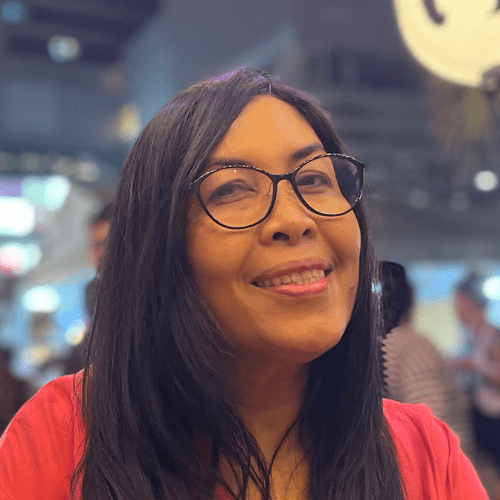
DTP alumna Nurul Qoiriah is the Inclusion and Victim Rights Director at the ASEAN-Australia Counter Trafficking. The partnership (funded by Australia) supports ASEAN States to implement and report under the ASEAN Convention against trafficking in persons, especially women and children (ACTIP-2015).
Nurul was recruited for this key regional position combating human trafficking, based on her work with the United Nations High Commissioner for Refugees (UNHCR), Counter-trafficking Program of USAID, and International Organization for Migration (IOM). She is focused on ensuring anti-trafficking projects and programs in ASEAN address gender equality, disability, social inclusion and victim rights in accordance with the ACTIP and other ASEAN and international human rights commitments.
Nurul participated in the 2006 DTP/Migrant Forum Asia (MFA) program in Malaysia on the rights of migrant workers in Asia. At the time she was a migrant rights activist, organising migrant domestic workers in Hong Kong, and migrant factory workers in South Korea, and Taiwan with Asian Migrant Centre. Hundred thousands of women from Indonesia, the Philippines and South Asia work in Hong Kong, and they are very vulnerable to abuses and exploitations, especially by employers and their recruiters. Before this Nurul was active in the democracy movement in Indonesia.
She says that participating in the DTP program ignited a passion in her to learn more about human rights, which is why she went on to do a Masters in Human Rights Law at the University of Hong Kong following that DTP training:
“In my view, DTP’s participatory training model is highly effective because DTP goes beyond theoretical knowledge and trains participants with hands-on knowledge about using various tools in their advocacy. For example, I remember that we had to write shadow reports for the UN committees. DTP also taught us how to use UN languages in advocacy campaigns, engage with the UN processes and even be mindful about wearing the right type of clothes in lobbying UN officials and lawmakers.”
Nurul was born and grew up in Indonesia’s Semarang province under the authoritarian era of Suharto’s rule. Semarang province was an industrial region, and many workers were going out of work. Her mum was a small business owner, and wanted Nurul to avoid political activism and to become either a nurse or teacher.
However, Nurul became interested in democracy and human rights when a group of university students campaigning about injustices and inequalities visited her high school. Nurul became a campus magazine editor in the university and started writing politically sensitive essays.
“The regional military command IV/Diponegoro revoked the campus magazine because I wrote an essay against the commercialization of education. Later I became the chair of the local chapter of Solidaritas Mahasiswa untuk Demokrasi (SMID); in English it was known as Indonesian Student Solidarity for Democracy. Ousting Suharto became our only objective.”
Nurul was one of 3000 students who staged a sit-in in the Indonesian parliament in 1998 to demand the end of Suharto’s rule. She then joined regional advocacy in Hong Kong.
Nurul says she wants to see a more equal and plural ASEAN region where the rights of all disadvantaged people, including women, children, LGBTQI, persons with disabilities, migrants and refugees, are more appreciated and legally protected.
Even though it was many years ago, the DTP/MFA training clearly made a lasting impact on Nurul. Among other things, Nurul really appreciated the way that DTP/MFA made the training a fun experience for the participants, despite the seriousness of the program content and purpose.
“I have been using the DTP training methodology in the training programs I delivered. DTP training is also fun. At the UNHCR and IOM, I used dance as an energizer in a workshop and made senior state officials dance such as Judges, prosecutors, Immigration and Police. My boss was nervous as those participants were senior officials, but I said they were human too, and eventually, those officials had fun in the training. Participating in DTP training gave me the inspiration and confidence to use that creative workshop energizer.”
DTP and Nurul recently reconnected at DTP’s training for Myanmar diaspora communities in ASEAN, and DTP is hopeful that Nurul may be able to return as a trainer for DTP. Nurul and DTP are also both currently working on issues of modern slavery, trafficking and migrant works in ASEAN’s fishing fleets.
DTP acknowledges the traditional custodians of the land on which we work, the Bedegal people of the Eora Nation. We recognise their lands were never ceded, and we acknowledge their struggles for recognition and rights and pay our respects to the Elders – past, present – and the youth who are working towards a brighter tomorrow. This continent always was and always will be Aboriginal land.
Aboriginal and Torres Strait Islander peoples should be aware that this website contains images or names of people who have passed away.
DTP acknowledges the traditional custodians of the land on which we work, the Bedegal people of the Eora Nation. We recognise their lands were never ceded, and we acknowledge their struggles for recognition and rights and pay our respects to the Elders – past, present – and the youth who are working towards a brighter tomorrow. This continent always was and always will be Aboriginal land.
Aboriginal and Torres Strait Islander peoples should be aware that this website contains images or names of people who have passed away.
Privacy Policy | Terms of Use | Disclaimer | Policies
© 2022 Diplomacy Training Program | ABN 31 003 925 148 | Web Design by Studio Clvr